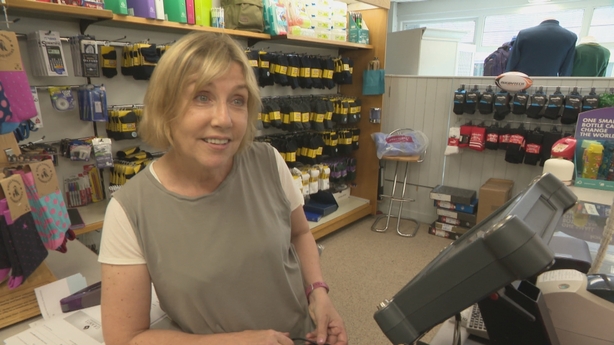Minister for Education Norma Foley has said the Government's provision of €53 million for free books in primary schools marked a momentous day in Irish education, adding that she hoped this could one day happen for secondary schools too.
Books for primary school students are now free under a new scheme, but there are calls for it to be extended to also cover second level.
Ms Foley said implementing the free schoolbook policy at a post-primary level, where the cost of schoolbooks can triple in cost, was an "absolute aspiration".
Speaking at St Matthew's National School in Sandymount, Ms Foley said that providing free schoolbooks for students at primary school level was an important first step in this process.
She said there would be a consideration for this policy in the coming budget, however she acknowledged there were many competing elements in terms of what can be achieved.
But she said it could be attained over time.
It follows a story in The Irish Times which found that parents were paying a cumulative €28m in voluntary contribution fees and that these payments were rising by more than €100 each year.
However, the minister said that under the Education Act no parent could be compelled to make these payments.
She said €1.5 billion had been made available to schools alongside a once-off payment of €90m for energy costs.
Engagement was continuing she said, adding that if an individual school had an individual issue, they could engage directly with the Department of Education.
CEO of the National Parents Council Aine Lynch said free books for primary schools was a significant investment which was welcomed by parents, including the effort around back to school preparations, but most significantly the reduction in costs.
"Often parents have children across the sector, and they might have children in secondary and primary at the same time, so these are significant costs," she said.
However, she said she was still concerned about other costs associated with going back to school.
Recruitment crisis
Ms Foley said the challenges with recruiting teachers in Dublin due to high living costs was not a unique problem.
She said her department was working with its partners to introduce measures to support schools, adding that there are more teachers or staff working in the education sector than ever before, with 4,000 teaching posts appointed at primary level and an additional 4,000 made available at post-primary in the last number of years.

Ms Foley said she did not underestimate the challenges facing the sector despite the creation of more teaching posts.
The minister said measures like the share teacher scheme, which allows educators to work across a number of schools, and the lifting of restrictions on job shares would help alleviate some of the stresses.
She added that student teachers were also being made available via higher education institutes.
But principals have expressed their worry that current issues with hiring teachers are having a negative impact on students with additional needs as special education teachers move into mainstream classrooms.
Speaking on RTÉ's Today with Philip Boucher-Hayes, Conor Reilly, Principal at Scoil Áine Naofa in Lucan, said he was unable to fill seven teaching positions which were advertised throughout the summer break.
He said applicants attended interviews but would ultimately accept positions outside of Dublin, adding "it is common across all the schools in Dublin at the minute".
This had an effect on learning support teachers who were then moved into mainstream classrooms to staff the school.
"I think one of the common misconceptions, when learning support hours are cut, is that it only affects those with learning support, those children," he said.
"It affects all of the children because it would have a knock-on effect then with the mainstream class, the teacher who is teaching that class," he added.

Important to maintain domestic uniform manufacturing
Karen Grant is the owner and manager of Grant's Uniforms in Stoneybatter in Dublin which has been in her family for four generations. Her daughter was also working in the shop this summer, meaning the trade is already being passed on to a fifth generation.
She says a suggestion from some charities that back-to-school costs could be cut by adding iron or sewn on crests to generic uniforms bought in department stores or supermarkets, would threaten Irish jobs in one of the last remaining parts of the clothes manufacturing industry in Ireland.
Speaking to RTÉ News about the provision of free schoolbooks by Government to primary school parents, she agreed this would mean some people would be less worried about back-to-school costs, but she argued cutting back on uniforms would be a mistake.
She said it was important to keep up the tradition of uniform manufacture in Ireland.
"Grants and Penders have supplied uniforms in Manor Street since 1920 when they were military tailors supplying uniforms and over the years, a lot of manufacturing has gone abroad so in Ireland very few clothes are still manufactured here, except for high end bespoke tailoring really."
School uniform manufacturing remains big in Kildare, where Deer Park Knitwear has operated in Monasterevin providing clothing to more than 650 retail outlets across Ireland.
Karen says this means that over 30 families in the location were kept in employment year-round. Skippy Sportwear in Roscrea, Co Tipperary, was another important local manufacturer and big employer in a rural area.
"This means that when people are spending their back-to-school allowance that they're spending it on Irish made goods in an Irish setting which research shows returns for every €10 spent on Irish made goods, we return €25 to the economy."
She said the return for foreign made goods was half of this.
She said her business dealt with a cross section of schools from across Dublin and she said a good quality tracksuit or jumper could last a child a full year, be handed down to siblings or given to charity.
She said the longevity and quality of Irish manufactured uniforms meant they could also be given directly to parents seeking help through Barnardo's or St Vincent de Paul.
